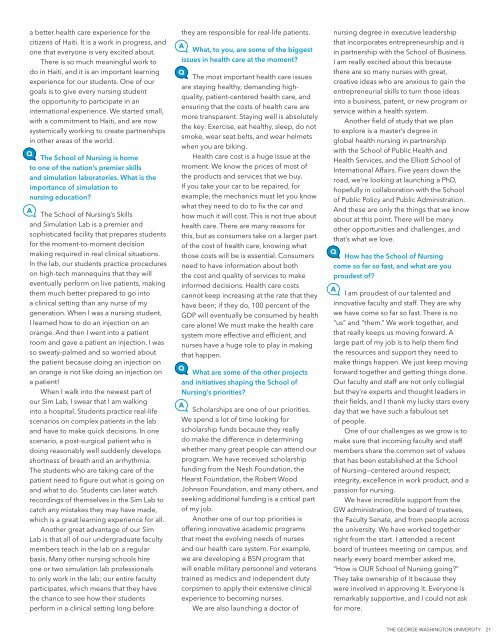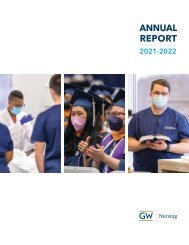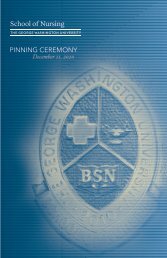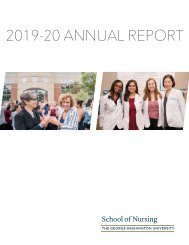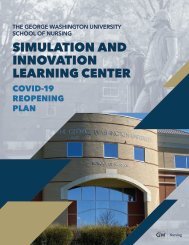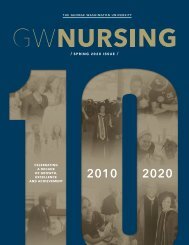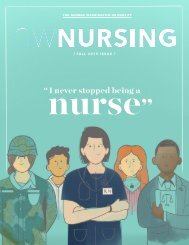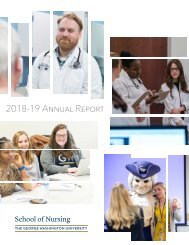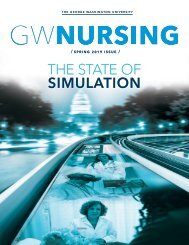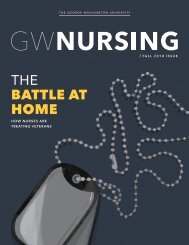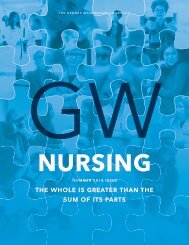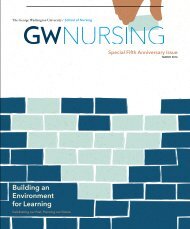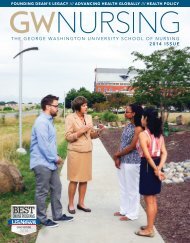GW Nursing Magazine Spring 2013
GW Nursing is a publication of the George Washington University School of Nursing. The magazine tells the story of GW nurses and their endeavors in the areas of education, research, policy and practice.
GW Nursing is a publication of the George Washington University School of Nursing. The magazine tells the story of GW nurses and their endeavors in the areas of education, research, policy and practice.
Create successful ePaper yourself
Turn your PDF publications into a flip-book with our unique Google optimized e-Paper software.
a better health care experience for the<br />
citizens of Haiti. It is a work in progress, and<br />
one that everyone is very excited about.<br />
There is so much meaningful work to<br />
do in Haiti, and it is an important learning<br />
experience for our students. One of our<br />
goals is to give every nursing student<br />
the opportunity to participate in an<br />
international experience. We started small,<br />
with a commitment to Haiti, and are now<br />
systemically working to create partnerships<br />
in other areas of the world.<br />
Q<br />
The School of <strong>Nursing</strong> is home<br />
to one of the nation’s premier skills<br />
and simulation laboratories. What is the<br />
importance of simulation to<br />
nursing education?<br />
A<br />
The School of <strong>Nursing</strong>’s Skills<br />
and Simulation Lab is a premier and<br />
sophisticated facility that prepares students<br />
for the moment-to-moment decision<br />
making required in real clinical situations.<br />
In the lab, our students practice procedures<br />
on high-tech mannequins that they will<br />
eventually perform on live patients, making<br />
them much better prepared to go into<br />
a clinical setting than any nurse of my<br />
generation. When I was a nursing student,<br />
I learned how to do an injection on an<br />
orange. And then I went into a patient<br />
room and gave a patient an injection. I was<br />
so sweaty-palmed and so worried about<br />
the patient because doing an injection on<br />
an orange is not like doing an injection on<br />
a patient!<br />
When I walk into the newest part of<br />
our Sim Lab, I swear that I am walking<br />
into a hospital. Students practice real-life<br />
scenarios on complex patients in the lab<br />
and have to make quick decisions. In one<br />
scenario, a post-surgical patient who is<br />
doing reasonably well suddenly develops<br />
shortness of breath and an arrhythmia.<br />
The students who are taking care of the<br />
patient need to figure out what is going on<br />
and what to do. Students can later watch<br />
recordings of themselves in the Sim Lab to<br />
catch any mistakes they may have made,<br />
which is a great learning experience for all.<br />
Another great advantage of our Sim<br />
Lab is that all of our undergraduate faculty<br />
members teach in the lab on a regular<br />
basis. Many other nursing schools hire<br />
one or two simulation lab professionals<br />
to only work in the lab; our entire faculty<br />
participates, which means that they have<br />
the chance to see how their students<br />
perform in a clinical setting long before<br />
they are responsible for real-life patients.<br />
A<br />
What, to you, are some of the biggest<br />
issues in health care at the moment?<br />
Q<br />
The most important health care issues<br />
are staying healthy, demanding highquality,<br />
patient-centered health care, and<br />
ensuring that the costs of health care are<br />
more transparent. Staying well is absolutely<br />
the key: Exercise, eat healthy, sleep, do not<br />
smoke, wear seat belts, and wear helmets<br />
when you are biking.<br />
Health care cost is a huge issue at the<br />
moment. We know the prices of most of<br />
the products and services that we buy.<br />
If you take your car to be repaired, for<br />
example, the mechanics must let you know<br />
what they need to do to fix the car and<br />
how much it will cost. This is not true about<br />
health care. There are many reasons for<br />
this, but as consumers take on a larger part<br />
of the cost of health care, knowing what<br />
those costs will be is essential. Consumers<br />
need to have information about both<br />
the cost and quality of services to make<br />
informed decisions. Health care costs<br />
cannot keep increasing at the rate that they<br />
have been; if they do, 100 percent of the<br />
GDP will eventually be consumed by health<br />
care alone! We must make the health care<br />
system more effective and efficient, and<br />
nurses have a huge role to play in making<br />
that happen.<br />
Q<br />
What are some of the other projects<br />
and initiatives shaping the School of<br />
<strong>Nursing</strong>’s priorities?<br />
A<br />
Scholarships are one of our priorities.<br />
We spend a lot of time looking for<br />
scholarship funds because they really<br />
do make the difference in determining<br />
whether many great people can attend our<br />
program. We have received scholarship<br />
funding from the Nesh Foundation, the<br />
Hearst Foundation, the Robert Wood<br />
Johnson Foundation, and many others, and<br />
seeking additional funding is a critical part<br />
of my job.<br />
Another one of our top priorities is<br />
offering innovative academic programs<br />
that meet the evolving needs of nurses<br />
and our health care system. For example,<br />
we are developing a BSN program that<br />
will enable military personnel and veterans<br />
trained as medics and independent duty<br />
corpsmen to apply their extensive clinical<br />
experience to becoming nurses.<br />
We are also launching a doctor of<br />
nursing degree in executive leadership<br />
that incorporates entrepreneurship and is<br />
in partnership with the School of Business.<br />
I am really excited about this because<br />
there are so many nurses with great,<br />
creative ideas who are anxious to gain the<br />
entrepreneurial skills to turn those ideas<br />
into a business, patent, or new program or<br />
service within a health system.<br />
Another field of study that we plan<br />
to explore is a master’s degree in<br />
global health nursing in partnership<br />
with the School of Public Health and<br />
Health Services, and the Elliott School of<br />
International Affairs. Five years down the<br />
road, we’re looking at launching a PhD,<br />
hopefully in collaboration with the School<br />
of Public Policy and Public Administration.<br />
And these are only the things that we know<br />
about at this point. There will be many<br />
other opportunities and challenges, and<br />
that’s what we love.<br />
Q<br />
How has the School of <strong>Nursing</strong><br />
come so far so fast, and what are you<br />
proudest of?<br />
A<br />
I am proudest of our talented and<br />
innovative faculty and staff. They are why<br />
we have come so far so fast. There is no<br />
“us” and “them.” We work together, and<br />
that really keeps us moving forward. A<br />
large part of my job is to help them find<br />
the resources and support they need to<br />
make things happen. We just keep moving<br />
forward together and getting things done.<br />
Our faculty and staff are not only collegial<br />
but they’re experts and thought leaders in<br />
their fields, and I thank my lucky stars every<br />
day that we have such a fabulous set<br />
of people.<br />
One of our challenges as we grow is to<br />
make sure that incoming faculty and staff<br />
members share the common set of values<br />
that has been established at the School<br />
of <strong>Nursing</strong>—centered around respect,<br />
integrity, excellence in work product, and a<br />
passion for nursing.<br />
We have incredible support from the<br />
<strong>GW</strong> administration, the board of trustees,<br />
the Faculty Senate, and from people across<br />
the university. We have worked together<br />
right from the start. I attended a recent<br />
board of trustees meeting on campus, and<br />
nearly every board member asked me,<br />
“How is OUR School of <strong>Nursing</strong> going?”<br />
They take ownership of it because they<br />
were involved in approving it. Everyone is<br />
remarkably supportive, and I could not ask<br />
for more.<br />
THE GEORGE WASHINGTON UNIVERSITY 21


